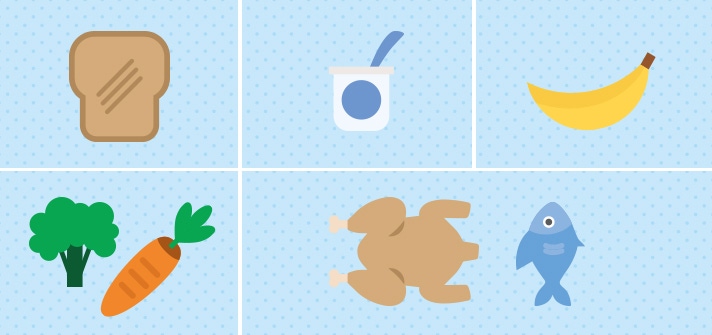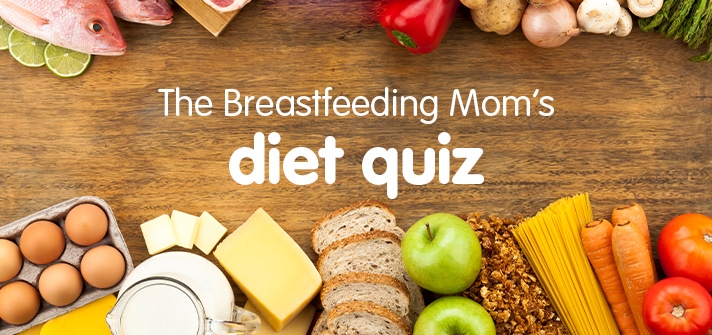

What to eat when you’re breastfeeding
When you’re breastfeeding it’s important to consume a balanced diet by eating appropriate amounts of foods from each of the main food groups. This will make sure you’re both getting the wide variety of nutrients you need to stay healthy. Eating well during this time not only supports your baby’s healthy development, it also nourishes your body while it does the incredible job of making breast milk.

Top 9 milk-changing nutrients
Scientific studies have shown that, among the variety of vitamins and minerals you both need, there are nine key nutrients that can influence the quality of your breast milk. Eating foods containing these nine nutrients can increase their concentrations in your breast milk – great news for your growing baby!
- Vitamin B1 (Thiamin)
- Vitamin B2 (Riboflavin)
- Vitamin B6
- Vitamin B12
- Vitamin A
- Vitamin D
- Iodine
- Selenium
- DHA (Docosahexaenoic acid)

Your daily nutritional checklist. Check to see if you’re consuming a balanced, nutrient-rich diet while breastfeeding.
- Did you eat 10 servings of grains today? (For example, 1 serving = 1 slice wholewheat bread, 1/3 cup cooked rice, or ¾ cup ready-to-eat unsweetened cereal)
Grains Galore! This is the recommended amount of foods containing essential nutrients, including fiber, iron, and magnesium.
Foods from the Grains Group also contain essential B vitamins (B1, B2, B3, and folic acid) and selenium. Three of these nutrients (B1, B2, and selenium) can influence the quality of your breast milk. B vitamins help your baby’s heart, brain, blood, sight, and nervous system develop healthily. They also help your baby grow and develop. Selenium is important for the healthy development of your baby’s brain and nervous system.
- How about 7 servings of meat/fish/protein? (For example, 1 serving = 30g (1oz) meat, fish, or poultry or 1 egg)
Protein-Rich! This is the recommended amount of foods containing important nutrients, including fiber, iron, and magnesium.
Foods from the Grains Group also contain essential B vitamins (B1, B2, B3, and folic acid) and selenium. Three of these nutrients (B1, B2, and selenium) can influence the quality of your breast milk. B vitamins help your baby’s heart, brain, blood, sight, and nervous system develop healthily. They also help your baby grow and develop. Selenium is important for the healthy development of your baby’s brain and nervous system.
- Did you eat 5 servings of fruit today? (For example, 1 serving = 1 extra small banana, 1 cup raspberries, or 17 grapes)
Fruitful! This is the recommended amount of fruit to help keep you and your baby healthy. Fruit contains important nutrients including potassium, vitamin C, folic acid, and fiber.
If you eat fruits such as cantaloupe, apricots, mango, and papaya, you also consume vitamin A. Eating more foods containing vitamin A can increase the amount in your breast milk. Vitamin A is a key nutrient for helping your baby’s vision, immune system, and healthy skin develop.
- How about 7 servings of vegetables? (For example, 1 serving = ½ cup cooked vegetables such as broccoli, ½ cup cooked canned tomatoes, or 1 cup raw vegetables, such as carrot)
This is the recommended amount of vegetables for breastfeeding moms. That means you consume potassium, vitamin C, folic acid, and fiber – all important nutrients for your health and to keep those energy levels up.
If you eat leafy green vegetables such as cabbage and spinach, you consume vitamin A, one of the top nine nutrients that can influence the quality of your breast milk. That means your baby is enjoying milk rich in a vitamin that helps his eyesight, immune system, and skin health.
- Have you had your 4 servings of dairy today? (For example, 1 serving = 1 cup milk or ¾ cup plain yogurt)
If not, drink up! This is the recommended amount of dairy products for healthy, breastfeeding moms. If you're meeting the required amount, this means you're consuming enough protein, calcium, and potassium. These nutrients will help support the health of your bones and teeth.
Some dairy products also contain vitamin D and iodine, two of the nine nutrients that affect the nutritional balance of your breast milk. Vitamin D is essential for your baby’s bone development. Iodine will help your baby’s nervous system and brain develop healthily.
Sources
Allen LH. B vitamins in breast milk: relative importance of maternal status and intake, and effects on infant status and function. Adv Nutr 2012; 3(3):362-9.
American Academy of Pediatrics Policy Statement. Breastfeeding and the use of human milk. Pediatrics 2012; 129:e827–41.
James DC, Lessen R. Position of the American Dietetic Association: Promoting and supporting breastfeeding. J Am Diet Assoc. 2009; 109(11):1926-42.
Kolasa KM, Firnhaber G, Haven K. Diet for a healthy lactating woman. Clin Obstet Gynecol 2015; 58(4):893-901.
Last revised: January, 2017















